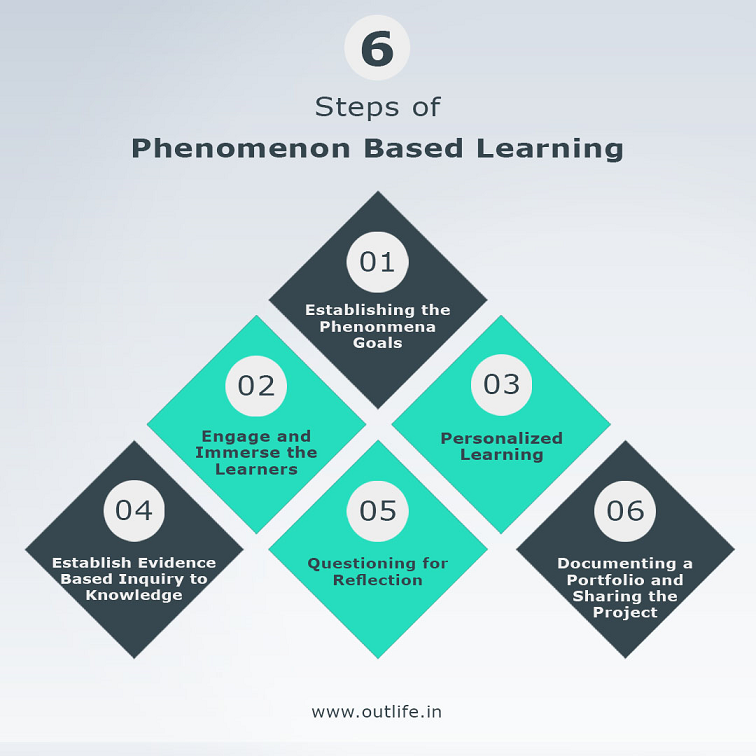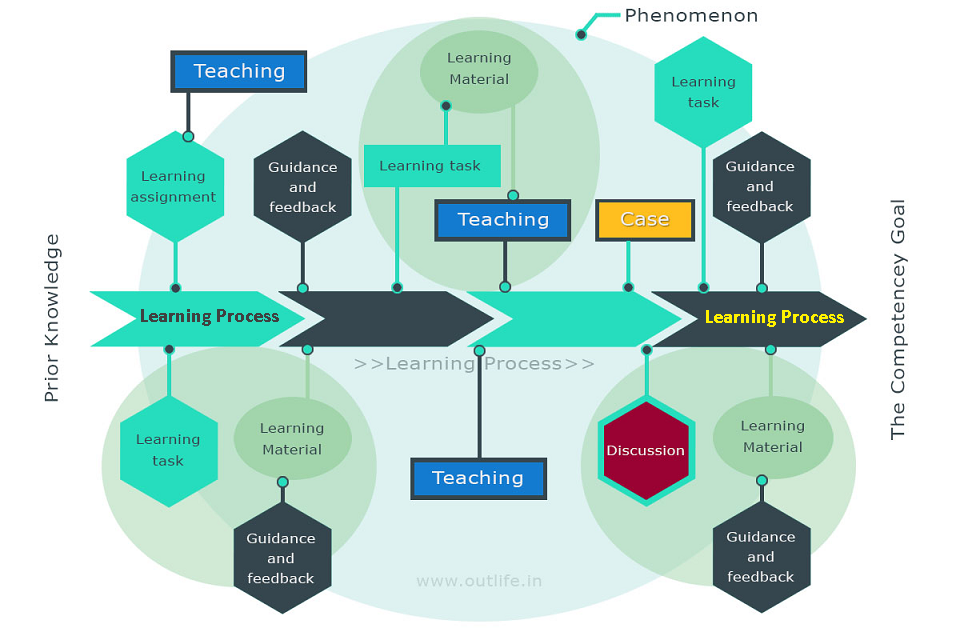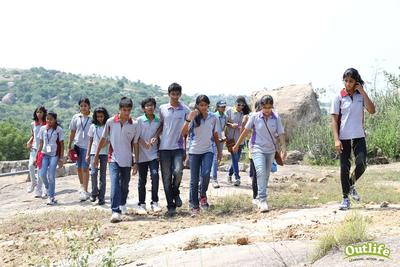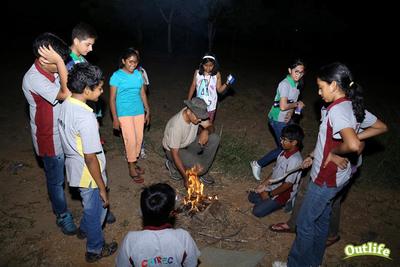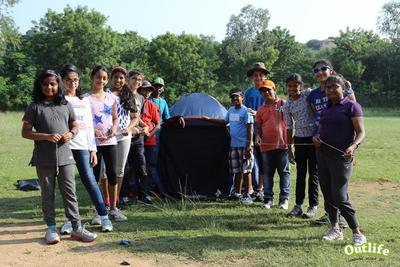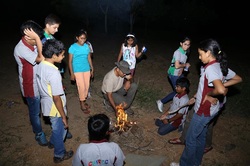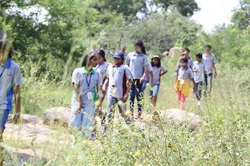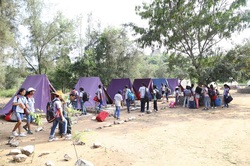Phenomenon Based Experiential Learning certification for Educators
What is a Phenomenon Based Experiential Learning (PBEL)
A Phenomenon based experiential learning is an intentional and planned approach towards learning integrated subjects that are chosen out of interest and co-created jointly by the educator and students to study a real world phenomenon in an interdisciplinary manner to bridge the gap between curriculum and real life such that it prepares the student with the necessary broad knowledge, attitude as well as the core skills needed in society and in the students future work life.
What is a Phenomenon
A phenomenon is an idea or event from the real world that is observed, studied and brought into the classroom to be examined from an interdisciplinary and multi-cultural perspective.
What is Phenomenon Based Learning
Phenomenon-based learning (PhenoBL) is a learner-centered, collaborative, multidisciplinary instructional approach that is based on student inquiry and problem solving through observation and study of a cultural and personal phenomena in the local context, where the learner investigate and solves their own questions by applying curriculum subjects that are relevant to the problem.
PhenoBL' is based on the principle that learning in school should be anchored in real world phenomena that cross discipline boundaries, and are identified by the learners as personally relevant to them. In Finland, phenomenon-based learning are common ways to implement interdisciplinary projects in school curriculum.
Instead of passively learning abstract or disconnected concepts, phenomenon-based learning presents real world problems and asks students to actively discover the knowledge, concepts and skills required to unravel them. Phenomenon based learning can be seen as a Pedagogical approach that includes both learning methods and learning content.
Its takes a real world approach and examines the immediate society in the students local contexts for its interpretation and understanding. Students experiences, questions and interests are taken into account that leads to creating curiosity and a encouraging learning atmosphere where learning is seen as a (socio)constructivist process.
Phenomenon-based learning lays the inspiration for truly preparing the coming generation to think and act like real-world scientists. PhenoBL allows students to have the freedom to own their own learning process, transforming them from passive participants to active learners.
A Phenomenon based experiential learning is an intentional and planned approach towards learning integrated subjects that are chosen out of interest and co-created jointly by the educator and students to study a real world phenomenon in an interdisciplinary manner to bridge the gap between curriculum and real life such that it prepares the student with the necessary broad knowledge, attitude as well as the core skills needed in society and in the students future work life.
What is a Phenomenon
A phenomenon is an idea or event from the real world that is observed, studied and brought into the classroom to be examined from an interdisciplinary and multi-cultural perspective.
What is Phenomenon Based Learning
Phenomenon-based learning (PhenoBL) is a learner-centered, collaborative, multidisciplinary instructional approach that is based on student inquiry and problem solving through observation and study of a cultural and personal phenomena in the local context, where the learner investigate and solves their own questions by applying curriculum subjects that are relevant to the problem.
PhenoBL' is based on the principle that learning in school should be anchored in real world phenomena that cross discipline boundaries, and are identified by the learners as personally relevant to them. In Finland, phenomenon-based learning are common ways to implement interdisciplinary projects in school curriculum.
Instead of passively learning abstract or disconnected concepts, phenomenon-based learning presents real world problems and asks students to actively discover the knowledge, concepts and skills required to unravel them. Phenomenon based learning can be seen as a Pedagogical approach that includes both learning methods and learning content.
Its takes a real world approach and examines the immediate society in the students local contexts for its interpretation and understanding. Students experiences, questions and interests are taken into account that leads to creating curiosity and a encouraging learning atmosphere where learning is seen as a (socio)constructivist process.
Phenomenon-based learning lays the inspiration for truly preparing the coming generation to think and act like real-world scientists. PhenoBL allows students to have the freedom to own their own learning process, transforming them from passive participants to active learners.
Guiding Principles:
The phenomena learning methodology is inspired by the Finland Education System and is guided by principles of Experiential Education, Project Based Learning, Inquiry Based Learning, Thematic Based Learning, Integrated Learning, Systems Thinking , Nature Education, Cooperative Play and Social Emotional Learning.
Methodology: In Phenomenon-Based Learning Expeditions, students develop critical and lateral thinking while working through inquiry and problem-based tasks. In these projects, teachers actively embed 21st century skills so that students develop social and cognitive cues essential for their future. The final products are assessed and publicly shared to deepen ties and relevancy to the real world.
Learning Orientations: Phenomenon-based learning is based on constructivist learning theory and socio-constructivist learning theory, as well as sociocultural learning theory which proposes that learning is best achieved by the learner actively constructing their own knowledge and experience in their local context and community, instead of by passive instruction and where learners work, learn and create meaning together in groups.
Theoretical frameworks: Phenomenon-based learning includes components of place based learning, project based learning, problem-based learning and inquiry-based learning and service based learning.
Learning Goals / Targets:
The learning goal or learning targets in phenomenal based learning expeditions are developed based on students interests and involves deep learning and understanding of the whole phenomenon, It combines different subjects that are integrated and uses different pedagogical methods and learning environments. The phenomenon is studied as a complete set of a whole in the real context in a cross-curricular way.
A phenomenon can be anything in the students local context such as:
The learning targets or Goals in a phenomenon based learning project covers a range of learning that includes Knowledge, Reasoning, Performance skills and Attitude. Product and Dispositions targets can also be included in the learning targets.
The Learning Targets are usually defined for:
The phenomena learning methodology is inspired by the Finland Education System and is guided by principles of Experiential Education, Project Based Learning, Inquiry Based Learning, Thematic Based Learning, Integrated Learning, Systems Thinking , Nature Education, Cooperative Play and Social Emotional Learning.
Methodology: In Phenomenon-Based Learning Expeditions, students develop critical and lateral thinking while working through inquiry and problem-based tasks. In these projects, teachers actively embed 21st century skills so that students develop social and cognitive cues essential for their future. The final products are assessed and publicly shared to deepen ties and relevancy to the real world.
Learning Orientations: Phenomenon-based learning is based on constructivist learning theory and socio-constructivist learning theory, as well as sociocultural learning theory which proposes that learning is best achieved by the learner actively constructing their own knowledge and experience in their local context and community, instead of by passive instruction and where learners work, learn and create meaning together in groups.
Theoretical frameworks: Phenomenon-based learning includes components of place based learning, project based learning, problem-based learning and inquiry-based learning and service based learning.
Learning Goals / Targets:
The learning goal or learning targets in phenomenal based learning expeditions are developed based on students interests and involves deep learning and understanding of the whole phenomenon, It combines different subjects that are integrated and uses different pedagogical methods and learning environments. The phenomenon is studied as a complete set of a whole in the real context in a cross-curricular way.
A phenomenon can be anything in the students local context such as:
- Music, Art, Poems
- Architecture, History
- Industry, Trade
- Food, Restaurants
- Economy, Businesses
- Cultural Heritage & Tourism
- Transportation
- Sustainability
- Sports,
- Environment, Nature/Animals/Plants
The learning targets or Goals in a phenomenon based learning project covers a range of learning that includes Knowledge, Reasoning, Performance skills and Attitude. Product and Dispositions targets can also be included in the learning targets.
The Learning Targets are usually defined for:
- Science and Technology
- Maths
- Environment
- Social Sciences - (Economics, Geography, History, Civics, Psychology, Sociology , Linguistics)
- Reading & Writing, Speaking & Listening
- Visual and Performing Arts
- System Thinking Skills
- Craftsmanship
- Character & Values
- Culture
Dimensions of Phenomenon Based Experiential Learning
Phenomenon-based approach to education has the following 5 Dimensions.
1) Holisticity,
2) Authenticity,
3) Contextuality,
4) Problem-based inquiry,
5) Open-ended learning processes.
Combined, these five dimensions provide a working model for educators when designing PhenoBL modules.
Holisticity refers to the need to de-compartmentalise education. A holistic approach will address an issue from multiple viewpoints and identify how different viewpoints dovetail or contradict (Halinen, 2018).
Viewing phenomena from the viewpoints of multiple different subject-based disciplines helps students to see the world in its complexity and seek out inclusive solutions to complex problems.
The dimensions of authenticity and contextuality highlight the importance of exploring a real-world phenomenon where students work to solve reallife problems in the community and learn in the process.
Authenticity refers to applying knowledge to something tangible, rather than engaging with only hypothetical and theoretical ideas (Symeonidis & Schwartz, 2016). Similarly, a contextualised phenomenon is one that exists within tangible time and space. A phenomenon by contrast is connected to a context during which it emerges.
Problem-based inquiry and open-ended learning processes are interlinked dimensions of Phenomenon Based Learning (Silander, 2015). When students explore a phenomena, they are required to identify and investigate problems or areas of interest or curiosity that may arise.
The larger aim with phenomenon based learning is for students and teachers to collaborate in creating investigations that are achievable and relevant to areas of the phenomenon that spark the students’ interests and one that can be mapped back to the curricula.
1) Holisticity,
2) Authenticity,
3) Contextuality,
4) Problem-based inquiry,
5) Open-ended learning processes.
Combined, these five dimensions provide a working model for educators when designing PhenoBL modules.
Holisticity refers to the need to de-compartmentalise education. A holistic approach will address an issue from multiple viewpoints and identify how different viewpoints dovetail or contradict (Halinen, 2018).
Viewing phenomena from the viewpoints of multiple different subject-based disciplines helps students to see the world in its complexity and seek out inclusive solutions to complex problems.
The dimensions of authenticity and contextuality highlight the importance of exploring a real-world phenomenon where students work to solve reallife problems in the community and learn in the process.
Authenticity refers to applying knowledge to something tangible, rather than engaging with only hypothetical and theoretical ideas (Symeonidis & Schwartz, 2016). Similarly, a contextualised phenomenon is one that exists within tangible time and space. A phenomenon by contrast is connected to a context during which it emerges.
Problem-based inquiry and open-ended learning processes are interlinked dimensions of Phenomenon Based Learning (Silander, 2015). When students explore a phenomena, they are required to identify and investigate problems or areas of interest or curiosity that may arise.
The larger aim with phenomenon based learning is for students and teachers to collaborate in creating investigations that are achievable and relevant to areas of the phenomenon that spark the students’ interests and one that can be mapped back to the curricula.
6 Steps of Phenomenon Based Experiential Learning
Phenomenon-based learning consists of the following Six stages:
1. Establishing the Phenonmena Goals: Studying the phenomenon begins by setting common goals and specifying the assessment criteria. The goals stem both from those set for the subjects' curricula and associated with the phenomenon, et al. supporting the learner's own starting points.
Students and teachers discuss the possible contents of the topics and present their 5 different subject approaches to the phenomenon. Students decide democratically on 1-3 approaches, which they want to take part in. Students and teachers determine the goals that they aim towards and co-create the schedule together according to the chosen content and topic.
2. Engage and Immerse the Learners: Learners become enthusiastic, immersed and motivated about the phenomena through texts, images, videos, visits and brainstorming. Phenomenon-based learning is a social process that builds together understanding of the phenomenon under observation into account, of the concepts studying and of the goals to be pursued.
3. Personalized Learning: As its student centered they chart their personal preconceptions about the phenomenon and their hopes and targets regarding it, and ask questions of their own about what they want to learn. In phenomenon-based learning, the goals and contents are derived from the goals of transversal competencies (21st century skills and employability skills) and subject areas.
The working method of phenomenon based learning is exploratory by nature and utilizes many experts as possible such as (teachers, experts, guardians, students themselves), as well as methods and sources in the disciplines. Teachers and educators structure the lessons in such a way that necessitates students interest and curiosity on multiple subject areas.
4. Establish Evidence Based Inquiry to Knowledge: Once a phenomenon is identified, educators employ problem-based learning and inquiry-based learning to conduct their investigations (Halinen, 2018; Lähdemäki, 2018). Problem based learning involves having the students pose a problem to be solved through actively getting involved; while inquiry-based learning involves the use of systematic methods and tools to solve a problem.
During the research and data acquisition stage, learners immerse themselves within the phenomenon by exploring it, examining it, visiting museums, or contacting experts. The learning process of the students includes planning, various learning assignments, experiential learning actvities, student assessment and guidance.
Different flexible teaching aids and arrangements are utilized in the study, and it also allows the students of various ages to cooperate and figure out discoveries together. Each student can proceed keeping in view his / her own abilities, he / she gets significant assignments within the cooperative learning process, feels his or her own part important and commits to a goal-oriented learning process.
5. Questioning for Reflection: Phenomenon Based Learning thrives on wonder, curiosity, and so students are encouraged to connect and question what is around them. Teachers guide the discovery process through posing questions that help the students to discover personal meaning.
Many Centuries ago, Socrates used a similar method of questioning to guide his students in order to support them to find the right answers on their own. PhenoBL follows this approach, prioritizing How over Why in order to inspire students to make personal observations and finally understand the Why.
6. Documenting a Portfolio and Sharing the Project: During the phenomenon learning process, the focus is on documenting and sharing what students have learned ; the goal here is to state and provide evidence of what the students have learned and how it affects their future. Documenting a Portfolio is very important so that the learners keep a record of what was learned during the process and also revisit it during sharing and learn from each other.
Creating a portfolio documents the discovery and learning process and also makes assessment a lot easier and more effective. Students are encouraged to self-evaluate and also seek peer to peer evaluation. The student receives immediate feedback during the learning process and the competencies demonstrated by the student are taken into account when verifying vocabulary or numerical grades.
1. Establishing the Phenonmena Goals: Studying the phenomenon begins by setting common goals and specifying the assessment criteria. The goals stem both from those set for the subjects' curricula and associated with the phenomenon, et al. supporting the learner's own starting points.
Students and teachers discuss the possible contents of the topics and present their 5 different subject approaches to the phenomenon. Students decide democratically on 1-3 approaches, which they want to take part in. Students and teachers determine the goals that they aim towards and co-create the schedule together according to the chosen content and topic.
2. Engage and Immerse the Learners: Learners become enthusiastic, immersed and motivated about the phenomena through texts, images, videos, visits and brainstorming. Phenomenon-based learning is a social process that builds together understanding of the phenomenon under observation into account, of the concepts studying and of the goals to be pursued.
3. Personalized Learning: As its student centered they chart their personal preconceptions about the phenomenon and their hopes and targets regarding it, and ask questions of their own about what they want to learn. In phenomenon-based learning, the goals and contents are derived from the goals of transversal competencies (21st century skills and employability skills) and subject areas.
The working method of phenomenon based learning is exploratory by nature and utilizes many experts as possible such as (teachers, experts, guardians, students themselves), as well as methods and sources in the disciplines. Teachers and educators structure the lessons in such a way that necessitates students interest and curiosity on multiple subject areas.
4. Establish Evidence Based Inquiry to Knowledge: Once a phenomenon is identified, educators employ problem-based learning and inquiry-based learning to conduct their investigations (Halinen, 2018; Lähdemäki, 2018). Problem based learning involves having the students pose a problem to be solved through actively getting involved; while inquiry-based learning involves the use of systematic methods and tools to solve a problem.
During the research and data acquisition stage, learners immerse themselves within the phenomenon by exploring it, examining it, visiting museums, or contacting experts. The learning process of the students includes planning, various learning assignments, experiential learning actvities, student assessment and guidance.
Different flexible teaching aids and arrangements are utilized in the study, and it also allows the students of various ages to cooperate and figure out discoveries together. Each student can proceed keeping in view his / her own abilities, he / she gets significant assignments within the cooperative learning process, feels his or her own part important and commits to a goal-oriented learning process.
5. Questioning for Reflection: Phenomenon Based Learning thrives on wonder, curiosity, and so students are encouraged to connect and question what is around them. Teachers guide the discovery process through posing questions that help the students to discover personal meaning.
Many Centuries ago, Socrates used a similar method of questioning to guide his students in order to support them to find the right answers on their own. PhenoBL follows this approach, prioritizing How over Why in order to inspire students to make personal observations and finally understand the Why.
6. Documenting a Portfolio and Sharing the Project: During the phenomenon learning process, the focus is on documenting and sharing what students have learned ; the goal here is to state and provide evidence of what the students have learned and how it affects their future. Documenting a Portfolio is very important so that the learners keep a record of what was learned during the process and also revisit it during sharing and learn from each other.
Creating a portfolio documents the discovery and learning process and also makes assessment a lot easier and more effective. Students are encouraged to self-evaluate and also seek peer to peer evaluation. The student receives immediate feedback during the learning process and the competencies demonstrated by the student are taken into account when verifying vocabulary or numerical grades.
Course Overview
This course gives educators the knowledge, skills, tools and techniques to understand what phenomenon-based learning is and how to design and facilitate projects based on this framework. Throughout the workshop, participants will have a chance to experience phenomena-based learning from the perspective of a student, and then discuss pedagogical and design strategies that support facilitation of student learning outcomes and curriculum guidelines as a teacher or educator.
Objectives of the workshop:
- To explain and demonstrate what is phenomenon-based learning and teaching.
- To learn design and facilitation of phenomenon-based projects in easy and simple approach.
- To assess phenomenon-based learning projects based on defined criteria and learning targets.
- To prepare the educator to provide an equitable education for all students through phenomenon based learning.
- To prepare the educator to build on the interests and curiosity of students and encourage full engagement and participation so that all students are motivated to learn.
- To prepare the educator to drive instruction and help their students deeply engage in arts, language and sciences through a phenomenon that is culturally and personally relevant to their students from their local context.
- To design and facilitate learning experience for students to develop knowledge, based on real word evidence and one that relates to their curriculum.
- To highlight the notion that education can explain aspects of the real world and vice versa and aid in understanding and designing solutions to problems that matter to students and their communities.
- To identify a phenomenon, define a problem/inquiry related to the phenomenon, and conduct an investigation.
- To prepare educators to help students learn, understand and relate to their real world contexts in their day to day environment.
Learning Outcomes
- Experience the process of phenomenon based learning.
- Have basic knowledge of phenomena and processes related to learning
- Have basic knowledge of design and development of phenomena based learning projects.
- Have basic knowledge of facilitation of phenomena based learning
- Have basic knowledge of processing experience and asking questions to generate student curiosity and understanding.
- Have basic knowledge of the relationship between interaction, learning and behaviour
- Be able to design a phenomenon in consultation with students and map it to student learning outcomes and curricula.
- Be able to act target-orientedly and constructively in interactive situations to create meaning out of the phenomenon.
- Be able to make education more personal and meaningful for self as an educator and for the students as the future generation.
- Be able to reflect on and develop their own activities based on the knowledge of phenomena based learning and student learning targets/outcomes.
- Have the confidence to design and facilitate a phenomenon based learning expedition with their students.
Phenomenon Based Learning is based on the principles of Experiential Education Methodology that comes from globally used evidence based approaches as witnessed in Finland education system.
Workshop Duration: 10 days in 2 phases
Practice
Requirements: Participants should have attended the 3 days foundation program on experiential education or similar program or 3 years of formal or non-formal teaching experience.
Offering: The program is offered both offline and online. The online sessions will be 2.5 hours per daily and will include 30 days of online virtual instructions combined with offline assignments and project work in the local context of educators.
Workshop Duration: 10 days in 2 phases
- Experiencing Phenomena Learning – Phase One – 5 Days
- Designing the Phenomena Learning Experience – Phase Two - 5 Days
Practice
- Facilitating the Phenomena Learning experience – Phase Three
Requirements: Participants should have attended the 3 days foundation program on experiential education or similar program or 3 years of formal or non-formal teaching experience.
Offering: The program is offered both offline and online. The online sessions will be 2.5 hours per daily and will include 30 days of online virtual instructions combined with offline assignments and project work in the local context of educators.
Experiencing Phenomena Learning – Phase One - 5 Days
During this Phase the Educators will experience phenomena based learning as a student to get a real world personal experience of the entire process.
Day 1
Day 2
Day 3
Day 4
Day 5
Day 1
- Context Setting and Introduction
- Crew Building
- Building Background Knowledge
- Wonder / HOOK Experience
- About Phenomena Learning
- Phenomena Expedition Launch and Learning Tracker
- Journaling and Reflection Time
- Evening Sharing Circle
Day 2
- Morning Circle Time
- Phenomena Observation – 1 - Personal Observation and Notes Making
- Solitude Time
- Discussions with Expert on Phenomena Observations
- Phenomena Observation -2 - Individual Research and one on one with Experts.
- Documentary Screening-1 and Q&A
- Reflection and Journaling
- Evening Sharing Circle.
Day 3
- Morning Circle Time
- Phenomena Observation -3 Guided Observation with Expert.
- Expert session on phenomena learning methodologies and systems
- Phenomena Observation - Focused observation- 4
- Phenomena Observation - Systems Thinking approach to understand a phenomena.
- One on one session with Experts.
- Documentary Screening -2 and Q&A
- Reflection and Journaling
- Evening Sharing Circle.
Day 4
- Morning Circle Time
- Illustration Workshop on Phenomena
- Chapter Composition and Writeup on phenomena observed.
- Work through multiple drafts of illustration and writeup.
- Individual Research and one on one with Experts.
- Reflection and Journaling
- Evening Sharing Circle.
Day 5
- Morning Circle Time
- Phenomena Illustration - Final
- Composition and Writeup - Final
- Final Product Brief.
- Experiential Learning Cycle
- Learning Style Inventory
- Introduction and Assignment for Phenomena Design Framework
- Reflection and Journaling
- Key Learnings
- Evening Sharing Circle and Closing.
Designing the Phenomena Learning Experience – Phase two – 5 Days
During this Phase the educators will attempt to design and plan for a phenomenon based learning for this students.
Day 1
Day 4
Day 5
Day 1
- Morning Circle
- Context and Intro to Phenomena Design Framework.
- Understanding the Phenomena Design Framework and its parts.
- Understanding Curriculum to Real World Gap
- 6 steps of the Phenomenon Based Learning.
- Designing Phenomena Learning for Curriculum through a real world phenomena
- Framing Big Idea and Guiding Questions
- Setting the learning context, direction and focus for expedition design
- Types of Learning Targets.
- Framing Learning Targets to Subject Wise Learning.
- Reflection and Journaling
- Evening Circle
- Morning Circle
- Revisit the Phenomena Design Framework
- Understanding the Experiential learning Cycle.
- Understanding Project Based learning, Problem based Learning and Inquiry based learning approaches.
- Educator as a Facilitator
- Facilitation Basics.
- Educator Role Profile Assessment
- Understanding systems thinking and Habits of a Systems Thinker.
- Generating Curiosity, Hook and Building Background Knowledge
- Crew Building through Play
- Building Craftmanship
- Holding Reflection sessions
- Day Reflection and Journaling
- Evening Circle
- Morning Circle
- Planning a Phenomena Expedition Launch
- Defining a Project-1
- Project Title and the Project Flow (Key Steps)
- Big ideas /Broader Concepts that we want to develop through the project
- Learning targets to be addressed
- Assessment plan for each learning target
- Creating Rubrics.
- Reflection and Journaling
- Evening Circle
Day 4
- Morning Circle
- Defining a Project-2
- Real life experiences (field Visits/ working with experts/ hands-on creation)
- Using Case study
- Creating Workshops and Mini lessons
- Real life experts sessions
- Multiple revisions and Improvement.
- Final product/performance
- Reflection and Journaling
- Evening Circle
Day 5
- Morning Circle
- Design and flow of final challenge/product and time-line…
- Planning Key Step, Focus of each step, Time duration and time-line
- Design Daily Instructional Plan
- Design Home /Class Assignments
- Design Assessments
- Design Record Book and Journal.
- The Expedition Culmination
- Closure of the Expedition.
- Launching the Actual Phenomena Learning Expedition
- Reflection and Journaling
- Feedback and Closing
Facilitating the Phenomena Learning experience – Phase Three.
Similar to phase 1 where a phenomena learning experience will be independently facilitated by the participants in their local context as per the phenomena learning design chosen by them for their students/participants and they will submit a report. The phase 3 can optionally be under observation/coaching of a facilitator from outlife.
Online LMS: Google Classroom/whatsapp will used to disseminate information, reading material and assignments for the participants.
Award of Certificate:
On Successful completion of the program and all assignments that include design and facilitation of the phenomena learning, participants will be awarded “certified phenomena learning educator” certificate from Outlife.
Facilitator: Diyanat Ali is a senior experiential educator, facilitator and coach with over 20 years of experience in the fields of management, education, training and coaching. He is the founder of the Great Hyderabad Adventure Club, India's premier adventure club from Hyderabad. He also founded Outlife a firm that offers solutions for education, training and development.
Diyanat has been working on experiential and outdoor education for over a decade and has been conducting phenomenon based learning projects for the last 4 years with different NGO'S, schools and learning communities. As a educator and consultant Diyanat has been praised for his presence, passion, energy and expertise on issues such as curriculum design / implementation, professional development and innovative pedagogy from various viewpoints. Diyanats way of combining theory and real world practice brings life to the key goals of the 21st century education.
Online LMS: Google Classroom/whatsapp will used to disseminate information, reading material and assignments for the participants.
Award of Certificate:
On Successful completion of the program and all assignments that include design and facilitation of the phenomena learning, participants will be awarded “certified phenomena learning educator” certificate from Outlife.
Facilitator: Diyanat Ali is a senior experiential educator, facilitator and coach with over 20 years of experience in the fields of management, education, training and coaching. He is the founder of the Great Hyderabad Adventure Club, India's premier adventure club from Hyderabad. He also founded Outlife a firm that offers solutions for education, training and development.
Diyanat has been working on experiential and outdoor education for over a decade and has been conducting phenomenon based learning projects for the last 4 years with different NGO'S, schools and learning communities. As a educator and consultant Diyanat has been praised for his presence, passion, energy and expertise on issues such as curriculum design / implementation, professional development and innovative pedagogy from various viewpoints. Diyanats way of combining theory and real world practice brings life to the key goals of the 21st century education.
Our School Clients
Chirec Public School
Pebble Creek Life School
Oakridge International School
Geetanjali School
Future Kids
SactaMaria
St Marys
Chirec Public School
Pebble Creek Life School
Oakridge International School
Geetanjali School
Future Kids
SactaMaria
St Marys
Our Other School Offerings
Outdoor EducationWe offer a diverse range of outdoor education programs designed provide for challenge and excitement by deliberately exposing students to elements of high risk. . Our programs present students with realistic outdoor challenges within safe and fun environments
|
Learning ExpeditionsExpeditions includes a process of planning and preparation, to managing and organizing resources and implementation of the expedition journey on ground. Students 'learn by doing'. They develop and practice the necessary concepts and skills through real time experiences along the way.
|
Adventure and Summer CampsWe conduct one day to 5 days camp where the kids get exposure to adventure actvities, nature based learning which helps them learn from the experiences and makes them self reliant and independent. The focus of the camps is to give the students the skills needed to develop confidence.
|
From Our Outdoor Education Blog
back-to-nature-part-1.html | back-to-nature-part-2.html | back-to-nature-part-3.html | back-to-nature-part-4.html

